A上海牛津英语六年级第一学期重点词组和句型
上海版牛津英语六年级(上、下)全重点知识点复习整理

上海版牛津英语六年级(上、下)全重点知识点复习整理上海牛津英语六年级上下册全知识点梳理频度副词always/sometimes/usually/never是频度副词,提问应该要用How often…?在句中的位置是:放在行为动词的前面,放在be动词的后面。
也可以说“行前系后”。
E.gShe is always kind.她总是很善良的。
She always helps other people.她总是帮助其他人。
不能出现这样的句子:She is always helps other people.(×)一句话中不能同时出现两个动词。
并且要注意主谓保持一致,尤其注意第三人称单数不可以忽略。
how often与how many timeshow often提问“频率次数+时间范围”how many times提问“频率次数”e.g.—How often do you exercise?—Twice a week.—How many times have you been there?—Twice.副词表示动作特征或性状特征。
一般用来形容或修饰除了名词和代词以外的词,主要修饰形容词、动词、其他副词和句子。
He looks very happy.(修饰描述词)The old lady is walking slowly now.(修饰动词)Luckily, he got the first prize.(修饰句子)描述词背面+ly构成副词:slow—slowlyslight—slightlyquick—quicklycareful—carefullyfierce—fiercelyimmediate—immediatelygentle—gentlylucky—luckilyhappy—happily介词What else do you do with your…?你和你的…还干什么?With是个介词,背面接人称代词时,要用宾格的形式。
上海牛津版六年级上Unit 1知识梳理
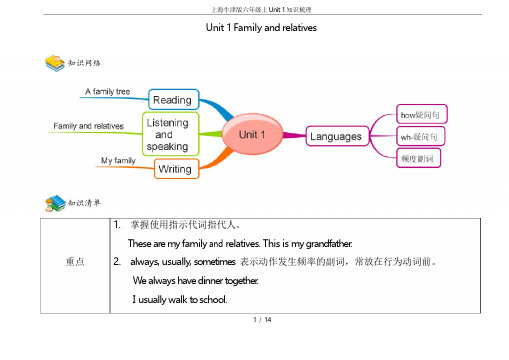
Unit1Family and relatives知识网络知识清单1.掌握使用指示代词指代人。
These are my family and relatives.This is my grandfather.重点 2.always,usually,sometimes表示动作发生频率的副词,常放在行为动词前。
W e always have dinner together.I usually walk t o school.1/14W e sometimes go swimming at the weekend.3.go shopping去购物,去买东西Alice and Betty often go shopping on Sundays.go+现在分词(v+ing)组成的词组表示“去(干……)go cycling,go swimming,go fishing1.The simple present tense一般现在时,尤其第三人称的变化和使用。
2.掌握并应用以下重点词汇及短语难点What else….?/only/family and relatives/a family tree/grandsons andgranddaughters/family members/with sb.易错点 1.一般现在时(尤其第三人称)否定及疑问的变化。
1.have的否定句和疑问句结构。
高频考点 2.always频度副词。
3.go doing表示进行某项活动。
牛津词汇2/14relative family tree granddaughter grandson only member*classmate n.亲戚;亲属家谱n.孙女;外孙女n.孙子;外孙adv.仅仅n.成员;会员n.同班同学sh o pgo shoppingelse*badmintoncyclego cyclingv.购物去购物adv.别的;其他的n.羽毛球v.骑自行车去骑自行车知识梳理第一部分:词汇精讲1.relative n.亲戚;亲属Do you have any relatives in Shanghai?你在上海有亲戚吗?【联想】family tree家谱,family member家庭成员【头脑风暴】granddaughter n.孙女;外孙女gr eat-granddaughter n.曾孙女;曾外孙女grandson n.孙子;外孙gr eat-grandson n.曾孙子;曾外孙grandfather n.祖父;外祖父grandmother n.祖母;外祖母3/14uncle n.叔叔,舅舅,姑父,叔父aunt n.阿姨,姑姑,舅母,婶婶sister n.姐,妹brother n.兄,弟cousin n.堂/表兄弟姐妹区别relative和family区别含义:在英语国家中,family通常指自己的父母、兄弟姐妹等成员;而relative指的是除此之外与自己有血缘关系或非血缘关系的亲属。
牛津英语(上海版)6年级上学期知识点罗列(4)

牛津英语(上海版)6年级上学期知识点罗列(3)1. enough to 足够来……I don’t have enough money to buy a bike. enough 是形容词,修饰名词moneyShe is old enough to drive a car. enough 是副词,修饰形容词old2. Alice always goes shopping by car. 同义句转换----Alice always goes shopping in a car.Alice always goes shopping on a bus.Alice always goes shopping on a bike.Alice always goes shopping in a taxi.Alice always goes shopping in his father’s car.在交通工具名称前,如果没有冠词,直接用by如果有冠词(an/a)或者所有格,介词用in/on正常的成年人能站立的交通工具用on,不能站立的用inAlice always goes shopping on a ferry.3. 表示“花费”的四种说法当主语是人pay…for… 金钱spend…on…金钱、时间spend … on sth.spend …( in) doing sth.当主语是物cost 金钱、时间take时间句型:it takes sb. some time to do sth. 做某事花费了某人多长时间It took me an hour to do the homework from Jack.It took me half an hour to go to school yesterday.4. The bank is ten minutes’ walk from here. 银行距离这有十分钟步行的路程。
上海版牛津英语六年级(上、下)全重点知识点复习整理
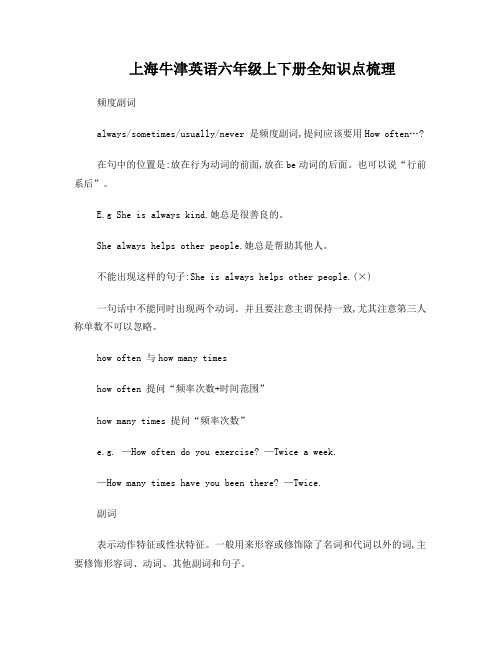
上海牛津英语六年级上下册全知识点梳理频度副词always/sometimes/usually/never 是频度副词,提问应该要用How often…?在句中的位置是:放在行为动词的前面,放在be动词的后面。
也可以说“行前系后”。
E.g She is always kind.她总是很善良的。
She always helps other people.她总是帮助其他人。
不能出现这样的句子:She is always helps other people.(×)一句话中不能同时出现两个动词。
并且要注意主谓保持一致,尤其注意第三人称单数不可以忽略。
how often 与how many timeshow often 提问“频率次数+时间范围”how many times 提问“频率次数”e.g. —How often do you exercise? —Twice a week.—How many times have you been there? —Twice.副词表示动作特征或性状特征。
一般用来形容或修饰除了名词和代词以外的词,主要修饰形容词、动词、其他副词和句子。
He looks very happy.(修饰形容词)The old lady is walking slowly now.(修饰动词)Luckily, he got the first prize.(修饰句子)形容词后面+ly构成副词:slow—slowly slight—slightly quick—quickly careful—carefully fierce—fiercely immediate—immediately gentle—gently lucky—luckily happy—happily介词What else do you do with your…?你和你的…还干什么?With是个介词,后面接人称代词时,要用宾格的形式。
沪教版牛津英语六(上)语法点
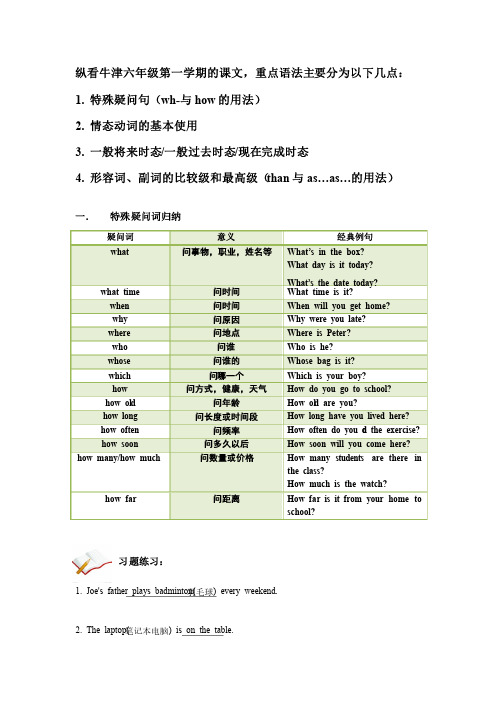
纵看牛津六年级第一学期的课文,重点语法主要分为以下几点: 1. 特殊疑问句(wh-与how 的用法) 2. 情态动词的基本使用3. 一般将来时态/一般过去时态/现在完成时态4. 形容词、副词的比较级和最高级(than 与as as……as as……的用法)一. 特殊疑问词归纳疑问词 意义经典例句what 问事物,职业,姓名等What’s in the box?What day is it today? What’s the date today? what time 问时间 What time is it? when 问时间 When will you get home? why 问原因 Why were you late? where 问地点 Where is Peter? who 问谁 Who is he? whose 问谁的Whose bag is it? which 问哪一个Which is your boy? how 问方式,健康,天气How do you go to school? how ol how old d 问年龄 How ol d are you? d are you? how long 问长度或时间段How long have you lived here? how often 问频率 How often do you d o the exercise? o the exercise? how soon 问多久以后 How soon will you come here? how many/how much 问数量或价格How How many many students are are there there in the class? How much is the watch? how far 问距离How How far far far is is is it it it from from from your your your home home to school? 习题练习:1. Joe's father plays badminton(羽毛球) every weekend.2. The laptop(笔记本电脑) is on the table. 3. My mother is a nurse in the hospital. 4. He gets up at 6:30 in the morning. 5. Li Lei goes to work on foot. 6. It is about 20 kilometers from my home to the town. 7. I have lived in Hang Zhou for 20 years. 8. I’m looking for my watch. 9. The train will start in three minutes. 10. Alice has the violin lesson twice a week. 11. The building with green wall is the post office. 12. He didn’t come because he was ill. 注意事项:由于特殊疑问词孩子们从小学就已经开始接触,对于最基本的what/how/where 等并不感到陌生,出题的难度一般也不会很大。
A上海牛津英语六年级第一学期重点词组和句型

6A 教材重点内容梳理Module One: Family and FriendsPhrases:1. family tree17. keep sth. clean2. go shopping/ cycling18. reuse Shopping bags3. each other19. put rubbish into rubbish bins4. look after20. leave rubbish5. pick up21. friends of the earth6. promise to do / not to do22. discuss sth. With sb.7. not⋯ at all23. at weekends/at the weekend8. cannot read or write24. a photo of sb9. be together25. be near / far from⋯10. be late for26.have lunch /dinner/ a picnic/a11. be friendly/ helpful / kind to barbecue12. share sth. With sb.27. fly kites13. get angry28. ride bicycles14. tell lies29. make sandcastles15. pollute the environment30. collect shells16. air / water /land pollutionSentence patterns:1.A: How many brothers/⋯ do you haveB: I (only) have one brother.2.A: what do you do with your⋯B: I always/usually/ sometimes play games with⋯ .A: What else do you do with sb.B: I sometimes⋯ with⋯3.A: Have you been to⋯B: I have just/already been to⋯ / there. / I haven’ t been to⋯ /there yet.4.What about/How about + n./ving⋯5.A: What do you usually do at weekendsB. I usually⋯6.A: Is⋯ near or far away from⋯B. It is near/ far away from⋯ .7.A: Where have you been8.B: I have been to⋯ .9.Which place shall we visit10.When shall we go there11.What time12.When are we going to come back13.How are we going to get there14.How much does it costModule Two: Places and ActivitiesPhrases:1. a bank clerk17. on the bus2. a shop assistant18. go to school3. put out fires19. a lot of/ some/ a fewnear/far away from school4. cook food advertisement board5. make our city a safe place22. light rail6. look at23. a department store7. listen to24. a housing estate8. arrive at25. a police station9. have tea26. half an hour10. at the entrance27. wait for11. on the ground/ first floor28. walk on the grass12. on the open day29. keep quiet13. at half past eight in the morning30. run across the road ,../Next, ⋯/Then, ⋯/After31. pick the flowers that,⋯ /Finally,⋯32. turn left/rightphotos33. on the right/left16. by ferry/ by underground/ on foot34. in the middle35. go upstairsSentence patterns:1. A: Would you like to be a/an⋯B: Yes, I would.A: Why/Why notB: I would /wouldn’ t like to be a/an⋯because I⋯2.A: What would you like to beB: I would like to be⋯3.A: Do you live near or far away from⋯B: I live near/far away from⋯ .A: How do you go to schoolB: I go to school by⋯/on foot.A: How long does it takeB: It takes⋯4.A: How long does it take you to get to⋯B: It takes me about⋯to get there.5.A: What does Simon see when he is walking to schoolB:Simon sees ...when he is walking to school.6.What does this sign mean7.We must not eat or drink./Don’ t eat or drink.8.We must ⋯9.A: Which escalator must we useB:We must use the one in the middle.Module Three: Food and Drinkphrases1. fried cabbage/chicken wings12. an unhealthy diet2. steamed prawns with garlic13. do exercise3. boiled eggs14. live in the countryside4. a shopping list15. stay with sb.5. at the vegetable stall16. plenty of / a lot of6. in the frozen food section17. a little/ some7. in the market/supermarket18. my favourite breakfast19. too much spicy food8. have a picnic20. eating habits9. a bottle of jam food pyramid10. a packet of nuts11. a slice / slices ofSentence patterns:1.A: What would you like for dinner tonightB: I’d like⋯for dinner.A: What kind of⋯would you likeWould you like⋯or⋯B: I’d like⋯2. A: Have you bought any⋯B: Yes, I’ ve bought some⋯A: Where did you buy it/themB: In the market, at the⋯stall/in the⋯section.A: How much was it/were theyB: It was /They were⋯yuan.3.A: Shall we buy some soft drinksB: Ok./ That ’ s a good idea.4.Let ’ s buy some bread and a bottle of jam.Let ’ s go to the supermarket to buy some food and drink for the picnic.5.A: Would you like some⋯B: No, thanks / yes, please6.A: Why do you like⋯B: I like it/them because it’ s/they’ re sweet/delicious/tasty/spicy.7.A: Why notB: I don ’t want⋯ because it is too⋯ .8.A: May I have some⋯ , pleaseB. Ok/ Sure/ All right/ Yes, you may. Here you are. I’ m afraid you can ’ t..9.A: How much sugar do we need every dayB:We need a little sugar every day.10.A: Which one was healthier/less healthyB:⋯’ s diet was healthier than/less healthy than/as healthy as/as unhealthyas ⋯’ s diet.11.How much ⋯ do we need12.What do you usually have for breakfast/ lunch /dinner13.A: What did you have for breakfast yesterday。
牛津英语六年级(全年级)重点知识点,句型,单词,短语整理总结
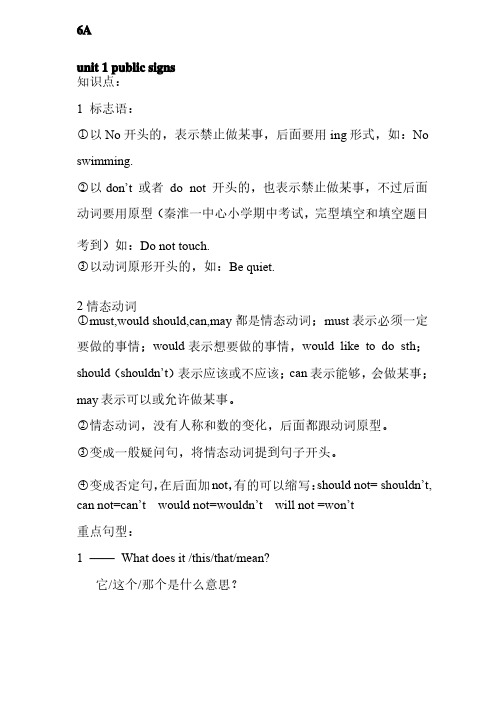
6Aunit 1 public signs知识点:知识点:1 标志语:标志语:○1以No 开头的,表示禁止做某事,后面要用ing 形式,如:No swimming.○2以don don’’t 或者或者do not 开头的,也表示禁止做某事,不过后面动词要用原型(秦淮一中心小学期中考试,完型填空和填空题目考到)如:Do not touch.○3以动词原形开头的,如:Be quiet. 2情态动词情态动词○1must,would should,can,may 都是情态动词;must 表示必须一定要做的事情;would 表示想要做的事情,would like to do sth ;should (shouldn shouldn’’t )表示应该或不应该;can 表示能够,会做某事;may 表示可以或允许做某事。
表示可以或允许做某事。
○2情态动词,没有人称和数的变化,后面都跟动词原型。
情态动词,没有人称和数的变化,后面都跟动词原型。
○3变成一般疑问句,将情态动词提到句子开头。
变成一般疑问句,将情态动词提到句子开头。
○4变成否定句,在后面加not ,有的可以缩写:should not= shouldn should not= shouldn’’t, can not=can can not=can’’t would not=wouldn would not=wouldn’’t will not =won will not =won’’t重点句型:重点句型:1 ————What does it /this/that/mean? 它/这个/那个是什么意思?那个是什么意思?It means you /wemust/should/shoudn It means you /wemust/should/shoudn’’t..意思是你/我们必须/应当/不应该。
解析:解析:当你不知道一个标志、一个词语或者一句话的意思时,可以用这句话来询问。
word完整版牛津沪教版英语六年级上重点知识复习及练习

牛津沪教版英语六年级上重点知识复习及练习六年级上重点知识复习及练习Part 1单词梳1spendv.度拓spend v.花b spend some time / some money (in) doing sthsb spend some time / some money on sthEg: Lucy spends five hours in doing her homework..注spend-spent-spent. cost花sth cost sb some money.某物花费了某人多少take花It takes sb some time to do sth做某事花了某人多久时2islandn.岛住在某岛live on.Eg: He lives on Chong Ming Island.3bayn.海近义harbour海4weekendn.周短语at weekends在周5seasiden.海拓side n.6luckyadj.幸运的,好运luckilyadv.反义unlucky; unluckily7.marketn.市supermarket超8. activityn.活activities(复active adj.活跃barbecuen.烧10.sandcastlen.沙11. collectv收collectionn.收集物(可数12. plan v.计短语plan to do sth.计划做某Eg: I plan to buy a new bag.13. shallmodal v.将要,好吗(主要对第一人称复数提问Eg: Shall we go out and play together?过去should14. cost花短语sth cost sb some money.某物花费了某人多少Eg: The book costs me ten dollars.15. trip n.旅短语a trip/ visit to some plac去某地旅8/ 1牛津沪教版英语六年级上重点知识复习及练习Part 2 短语整理一起在外度过一天 1. spend a day out together在绿岛2. on Green Island在快乐3. in Happy Town在龙4. in Dragon Bay在幸运岛5. on Lucky Island在周6. at weekends = at the weekend离开某地近7. be near sp.离开某地远8. be far (away) from sp海边9. Seaside Town一张我家人和我的照10. a photo of my family and me一起吃午11. have lunch together格林市12. Green Market在太阳13. In Sunny Town太空博物14. Space Museum在月亮15. In Moon Town一项活16. an activity进行一次烧17. have a barbecue放风18. fly kites骑自行19. ride bicycles筑沙20. make sandcastles收集贝21. collect shells制作一本照片22. make an album计划做某23. plan to do sth.一个好主24. a good idea哪一个地25. which place计划一次旅26. plan a trip……怎么样?(常用于表示建议或提议27. How abou打算做28. be going to + v.Part 3基础练一单项选-ups _________ this .( ) 1 . Let's do some pusD . withB . forC . like A . at) 2 . Boys are interested __________ ball games .(D . in playC . to played A . in playing B . at play) 3 . This room is ____________ .(D . Alice and Betty'C . Mary's and Joan' A . Tom's and Mik B . Alice and Lucy ) 4 . Why not __________ for a walk ?(D . goingB . go C . went A . to go) 5 . How _________ the little girl walks !(D . more quicklyC . quicker A . quick B . quickly) 6 . We hope _________ the game .(D . to winningB . wonC . to win A . winning) 7 . The accident happened _________ a cold winter evening .(D . inC . on B . at A . from8/ 2牛津沪教版英语六年级上重点知识复习及练习) 8 . Let's read the text , _____________ ?(D . do you C. will you A . do we B . shall we”in English ?( ) 9 . How can you ________ “在晚D . talkC . say A . speak B . tell ) 10 . Sports can keep us __________ .(D . healthyC . unhealthy A . health B . healthily用所给单词的适当形式填1. What would you like _________ (have) for your dinner tonight?2. You have enough time to do the work. You don't need _________ (finish) it nowyou a shirt for your birthday. What colour do you like bestbu3. Bill, let me _________4. Where will we go __________ (look) for the missing mobile phone?5. Tom asked me if I would go _________ (windsurf) with him.Let' s take the elevato.(four)6. Toys for Kids is on the______ floor.(shop)7. Most of the_____ _malls in Canada are near city centres,I' 11 wear the T - shirt with the long______. ( sleeve)8. It' 11 be very sunny tomorrow.(change) Can I try on the shirt in the______ room? Of course you can.9.改写句保持愿意不)1. How about taking a walk after dinner? take walk after dinner._________ __________保持愿意不)2. He wouldn't like to be a cook in the future. to be a cook in the future.He ___________ ______________)3. The book cost me 20 yuan. 划线部分提the book cost ?________ __________4. Kitty is a very friendly student. 感叹)Kitty is!________ ________)5. He is our Chinese teacher. 保持愿意不Chinese.He _________ _________改为否定)6. She helps me clean the house. clean the house.She ________ __________Part 4综合练Reading and comprehensionAThis is a question many students ask. In my opinion, the most effective way is to learnHow can I learn English well?nlessons by heart. If you can recite the text and write it out, you've learned it fairly well. And if you can tell, in your oy successful learner indeed. Your English will be quite perfect.words, what the lesson says you're a veyouThis is a difficult task. However, if you try to learn by heart only part of each lesson, you'll find it not half so hard asmight have thought.towayonouranecessary.writingisalsoIthelpsyoulotcourse,progress.makeyouthisLearningway,willrapidOf success in English.Equally important is to feel the language. You should be able to laugh at jokes and be shocked at bad news. When usingEnglish, try to forget your mother tongue. Instead of helping you, your own language gets in your way. So, never try to seeEnglish through translation.1.In the writer's opinion, the most effective way in learning English is ____A.to practise speaking, writing and feeling itB.to forget your own native languageC.to translate everything into his own languageD.to memorize the English words and grammatical rules8/ 3牛津沪教版英语六年级上重点知识复习及练习2. “Instead of helping you, your own language gets in your way.”This sentence means that memorizing your own languagecan ________.B.stop you mastering English A.help you to study English wellD.help you notice mistakesC.make English easy to learn3.Equally important is to feel the language. “to feel the language”here means________.A.to get a knowledge of English by touchingB.to be able to read and write EnglishC.to translate English into your own by imaginingD.to be able to experience the rich sensation of the languageBWhen we can see well, we do not think about our eyes often. It is only when we can not see perfectly that we come to seehow important our eyes are.People who are nearsighted can only see things that are very close to their eyes. Many people who do a lot of close work,such as writing and reading, become nearsighted. Then they have to wear glasses in order to see distant things clearly.People who are farsighted face just the opposite problem. They can see things that are far away, but they have difficultyget glasses too.reading a book unless they hold it at arm's length. If they want to do much reading, they musOther people do not see clearly because their eyes are not exactly the right shape. This, too, can be corrected by glasses.isSome people's eyes become cloudy because of cataracts. Long ago these people often became blind. Now, however, itpossible to operate on the cataracts and remove them.When night falls, colors become fainter to the eyes and finally disappear. After your eyes have grown used to the dark, youcan see better if you use the side of your eyes rather than the centers. Sometimes, after dark, you see a small thing to oneside of you, which seems to disappear if you turn your head in its direction. This is because when you turn your head, youat the thing too directly. Men on guard duty sometimes think they see something moving to one side of them.arelookinthismistaken.However,andtheybelievetheywerestraightatit,theycannotseeitanymore,Whentheytur ntolookmistake happens because the center of the eye, which is very sensitive in daylight, is not as sensitive as the sides of the eyeafter dark.4.We don't know that our eyes are of great importance until ________B. we cannot see clearlyA. we think about our eyesD. we have to do much readingC. we wear glasses5.According to the passage, a ________ is more likely to be nearsighted.D.painterC. guardA.tailorB. doctor6.People who are farsighted ________ .A.cannot do a lot of close work without glassesB.can only see things that are very close to their eyesC.have difficuly reading a book if they hold it at arm's lengtD.have the same problem as the nearsighted people7.To see a small thing at night, it is better to look ________ .B.with half shut or narrowed eyesA.with wide open eyesD.in a slightly different directionC.straight at itC Read and answer the questions.difference.noofbirthdays.庆)theirAmericanchildrenaretowordoverfromChildrenallthelikecelebrateAmerican children usually celebrate with a party. They invite their friends to join the party. The party may not be held on theexact date of birthday if it comes to a school day. It may be held on the closest weekend instead. Today two kinds of parties are the most popular. One is held at home. Parents make their house beautiful with balloonsand coloured paper. They prepare a special birthday meal. The children play games. The other one is held away from home.Some are at a special restaurant. The children eat pizza and ice cream. The waiters, who serve the food, also sing and telljokes to the children. Other parties may be held at a park, a movie theatre or some other places.8/ 4牛津沪教版英语六年级上重点知识复习及练习Every birthday party has a birthday cake with candles on it. There is one candle for each year of a birthday boy. or girl'sage. When the candles are lighted, everyone sings the special birthday song: HAPPY BIRTHDAY TO YOU.79. When will they hold their birthday party if the birthday comes to a school day?________________________________________________________80. Are there only two kinds of parties?________________________________________________________81. Are parents very busy when the party is held at home?________________________________________________________82. What do the waiters do to the children to celebrate their birthday?________________________________________________________83. Where may other parties beheld?________________________________________________________84. When you are twelve years old, how many candles do you need?________________________________________________________首字母填Dclasses. They can do things they want to do. Mary will go to the1It's Sunday today. The students have n hard.3to see a film with her friends. Tony and some other boys are going to play football. Eddiewc____2__on TV. They will b__6___to the library to read the books. John is going to watch a football m5He is g4 very happy..__________ 6. __________1. __________ 2. __________ 3. ___________ 4. ________四.练I用现在进行时改写句Tom can speak Chinese.1We have four lessons.23I watch TV everyday.She works in a hospital.4.):选择最恰当的答I. Choose the best answer Lucky Island?___________1.Where have you beenD. fromC. inA. atB. on.2.Look, this is a photo of____________D. I and youB. me and youA. you and IC. you and me__________ China. People usually go there by air.3.The USA isD. far away fromB. awayC. far awayA. farHave you ever been to Thailand?4.wice.Yes, I have. I have been _____________D. itC. thereA. to thereB. to it8/ 5牛津沪教版英语六年级上重点知识复习及练习___________ your father usually ____________ at weekends?_5. WhatD. will; do C. did; do A. do; do B. does; do. 6. Alice is a friend ofD.mineB. IC.myA. mepiano.7.Jack likes to playfootball. His sister, Mary, likes to playD./;/B. the;theC./;theA. the; /Shanghai.8.Here is a mapD. atC. forA. ofB. inin her spare time.9.My mother likesB.to go shopsA. go shoppingD. to going shoppingC. going shoppingseven o'clock.10. He arrived at the History MuseumD. onforB. inC.A. at11. We are going to visit the Bund _____________ .B. last SundayA. next SundayD. the SundayC. on SundaysHow can we get to the Space Museum?12.bus.Let's go ______________D. at aA. onB. byC. in afilm?13.I feel so bored. How about _____________D. seeingC. to seeingA. to seeB. see?14.What time will you come ____________D. backC. to homeA. thereB. to here____________ happily.15.Look, the studentsB. playA. are playingD.is playinC. played. Complete the sentences with the given words in their proper forms 用所给单词的适当形式完成句)of my family and me. (photo)1. These are somecenters in Shanghai. (shop)2. There are a lot of_______________ . (birth)3. Tomorrow will be my tenth4. This is a photo of Ben and_______________ father. (he)here. (friendly)5. He got some new______________True or False. 阅读短文,判断正It's Sunday today. It's five o'clock in the afternoon. Dick is going to the supermarket with his parents. His father is nowcleaning the car. He is going to drive his family to the supermarket. It is far away from their home. His mother is going tbuy a lot of food: bread, milk, fruit and drinks. She also wants to buy many other things for the next week. Dick wants tobuy a video game machine. His father says to him, 'OK, but you mustn't play video games all the time.After class you mustgo over your lessons and do your homework first.'They are going to have dinner there and come back at nine o'clock in the evening.They will enjoy themselves very much.Dick and his parents are going to do some shopping today.) 1(8/ 6牛津沪教版英语六年级上重点知识复习及练习They are going to the supermarket by bus. ( ) 2The supermarket is not far away from their home.( ) 3Dick's mother is going to buy a lot of food for the next week.) 4 (Dick is going to buy a video game machine but he can't play it all the time. ( ) 5They are going to stay in the supermarket for 5 hours.( ) 6.Choose the right answer. ⅤIt's Sunday. Mother, father and the children are going to the beach.Where are we going, Dad? Alice:Let's look at the map. Let me see. We will go to the East Point Beach. Father.We'll swim in the sea. Mother:Are we going to have a picnic? David:Alice: Yes, of course.David: That's nice.Father: Come on! Let's all get in the car!怎么了), Dad? Alice: What's wrong ( )! 发动Father: The car can't start ( Mother: So we will all stay at home.Let's have a picnic in the garden! Alice:Great!David:.)1 The family is going to ____________ (C. swim and have a picnicB. have a picnicA. swim in the sea___________ ._ ( )2 They are going thereC. by underground B. by carA. by bus______________ .)3 They won't go to the beach (because it is rainy A.because Father is not fine B.because the car doesn't startC.They will have the picnic _____________ in the end.( ) 4A. on the beachin the garden B.in the car C.Ⅵ.Read the passage and fill in the blanks with proper words.It will be grandfather's s______________ birthday next Sunday. We are going to have a big birthday p____________.c______________for a to I him. some will and Uncles aunts buy p______________for But want make nice birthdaygrandfather. Mum and Dad are going to buy a lot of food from the s______________.】【Keys 1. Tom is speaking Chinese. I.8/ 7牛津沪教版英语六年级上重点知识复习及练习2. We are having four lessons.3. I am watching TV now.4. She is working in a hospital.5. Are you reading this book?6. Kitty and Ben are having lunch at about twelve.7. His father is helping them.8. They are watching TV in the evening.11-15 ABDD6-1DCACAII. 1-BCDCB5. friends4. his. 1. photos2. shopping3. birthday. TFFTTF. CBCB. sixtieth/ seventieth, party, presents, cake, supermarket.8/ 8。
(word完整版)牛津沪教版英语六年级上重点知识复习及练习
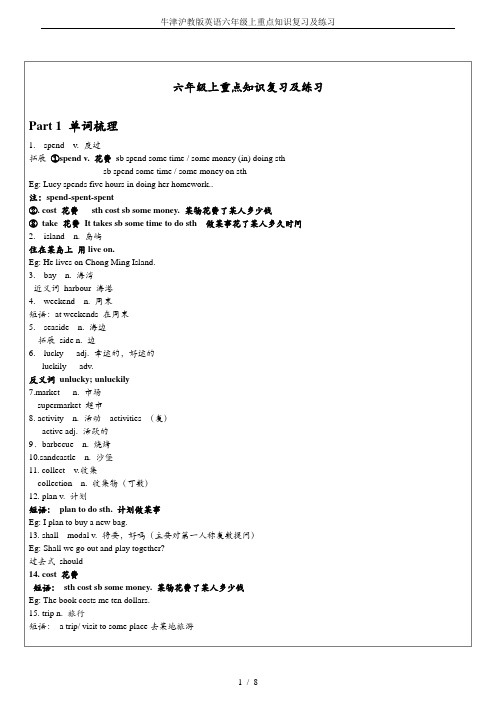
2. “Instead of helping you, your own language gets in your way.”This sentence means that memorizing your own language can ________.A.help you to study English wellB.stop you mastering EnglishC.make English easy to learnD.help you notice mistakes3.Equally important is to feel the language. “to feel the language” here means________.A.to get a knowledge of English by touchingB.to be able to read and write EnglishC.to translate English into your own by imaginingD.to be able to experience the rich sensation of the languageBWhen we can see well, we do not think about our eyes often. It is only when we can not see perfectly that we come to see how important our eyes are.People who are nearsighted can only see things that are very close to their eyes. Many people who do a lot of close work, such as writing and reading, become nearsighted. Then they have to wear glasses in order to see distant things clearly. People who are farsighted face just the opposite problem. They can see things that are far away, but they have difficulty reading a book unless they hold it at arm’s length. If they want to do much reading, they must get glasses too.Other people do not see clearly because their eyes are not exactly the right shape. This, too, can be corrected by glasses. Some people’s eyes become cloudy because of cataracts. Long ago these people often became blind. Now, however, it is possible to operate on the cataracts and remove them.When night falls, colors become fainter to the eyes and finally disappear. After your eyes have grown used to the dark, you can see better if you use the side of your eyes rather than the centers. Sometimes, after dark, you see a small thing to one side of you, which seems to disappear if you turn your head in its direction. This is because when you turn your head, you are looking at the thing too directly. Men on guard duty sometimes think they see something moving to one side of them. When they turn to look straight at it, they can not see it any more, and they believe they were mistaken. However, this mistake happens because the center of the eye, which is very sensitive in daylight, is not as sensitive as the sides of the eye after dark.4.We don’t know that our eyes are of great importance until ________.A. we think about our eyesB. we cannot see clearlyC. we wear glassesD. we have to do much reading5.According to the passage, a ________ is more likely to be nearsighted.A.tailorB. doctorC. guardD.painter6.People who are farsighted ________ .A.cannot do a lot of close work without glassesB.can only see things that are very close to their eyesC.have difficult y reading a book if they hold it at arm’s lengthD.have the same problem as the nearsighted people7.To see a small thing at night, it is better to look ________ .A.with wide open eyesB.with half shut or narrowed eyesC.straight at itD.in a slightly different directionC Read and answer the questions.Children from all over the word like to celebrate (庆祝) their birthdays. American children are of no difference. American children usually celebrate with a party. They invite their friends to join the party. The party may not be held on the exact date of birthday if it comes to a school day. It may be held on the closest weekend instead.Today two kinds of parties are the most popular. One is held at home. Parents make their house beautiful with balloons and coloured paper. They prepare a special birthday meal. The children play games. The other one is held away from home. Some are at a special restaurant. The children eat pizza and ice cream. The waiters, who serve the food, also sing and tell jokes to the children. Other parties may be held at a park, a movie theatre or some other places.( ) 2 They are going to the supermarket by bus.( ) 3 The supermarket is not far away from their home.( ) 4 Dick's mother is going to buy a lot of food for the next week.( ) 5 Dick is going to buy a video game machine but he can't play it all the time.( ) 6 They are going to stay in the supermarket for 5 hours.Ⅴ.Choose the right answer.It's Sunday. Mother, father and the children are going to the beach.Alice: Where are we going, Dad?Father. Let's look at the map. Let me see. We will go to the East Point Beach.Mother: We'll swim in the sea.David: Are we going to have a picnic?Alice: Yes, of course.David: That's nice.Father: Come on! Let's all get in the car!Alice: What's wrong (怎么了), Dad?Father: The car can't start (发动)!Mother: So we will all stay at home.Alice: Let's have a picnic in the garden!David: Great!( )1 The family is going to ____________ .A. swim in the seaB. have a picnicC. swim and have a picnic( )2 They are going there ____________ .A. by busB. by carC. by underground( )3 They won't go to the beach ______________ .A. because it is rainyB. because Father is not fineC. because the car doesn't start( ) 4 They will have the picnic _____________ in the end.A. on the beachB. in the gardenC. in the carⅥ.Read the passage and fill in the blanks with proper words.It will be grandfather's s______________ birthday next Sunday. We are going to have a big birthday p____________. Uncles and aunts will buy some p______________for him. But I want to make a nice birthday c______________for grandfather. Mum and Dad are going to buy a lot of food from the s______________.【Keys】I. 1. Tom is speaking Chinese.。
六年级上册英语沪教牛津版知识要点

Module 1 Getting to know each other一、核心词汇1.表示时间名词:month 一个月的时间;月份yesterday 昨天2.形容词:cute 可爱的pretty 漂亮的handsome 英俊的;帅气的famous 著名的;知名的healthy 健康的;有益于健康的unhealthy 不健康的;损害健康的3.动词:catch 逮住;捕捉spend 度过pick 采摘4.食物名词:hamburger 汉堡包fruit 水果pie 馅饼pizza 比萨饼cola 可乐sandwich 三明治vegetable 蔬菜chicken 鸡肉chocolate 巧克力5.表示动物名词:turtle 乌龟fly 苍蝇6.其他:during 在……期间everyone 每个人;所有人countryside 乡村;农村7.核心词组:grow up 长大;成长junior high school 初级中学(be)born 出生summer holiday 暑假the Great Wall 长城the Palace Museum 故宫博物院Tian’an men Square 天安门广场go swimming 去游泳go to the museum 去博物馆go to the cinema 去电影院junior high school 初级中学do my homework 做我的家庭作业watch TV 看电视visit my friends 拜访我的朋友a little 少量的fish and chips 炸鱼薯条二、了解词汇1.一些动词及过去式:go(去)—went do(做)—didhave/has(有)—had watch(观看)—watchedvisit(访问;探望)—visited am/is(是)—was are(是)—were 2.一些食物名词:egg 鸡蛋bread 面包noodles 面条dumplings 饺子3.其他:menu 菜单三、核心句型1.H er hair was short and her eyes were big. 她那时头发很短而且眼睛很大。
2022-2023学年上海牛津版英语六年级上册Unit1 词组整理

Unit 1 Family and relativesI.词组Part 11.a family tree一个家谱A nuclear family 一个核心家庭An extended family 一个大家庭Nephew 侄子Niece 侄女Part 22. Alice has got a lot of presents, hasn’t she?爱丽丝有很多礼物,是吗?Alice has a lot of presents, doesn’t she?爱丽丝有很多礼物,是吗?3. in pairs两人一组in groups按小组4. decide who Alice’s birthday cards are from决定爱丽丝的生日卡片是来自谁的Who are Alice’s birthday cards from?爱丽丝的生日卡片是来自谁的?5. make a birthday card for sb= make sb a birthday card为某人做一张生日卡片6. How many uncles do you have?你有多少叔叔?How much money do you have?你有多少钱?7. talk about each other’s family members讨论一下彼此的家庭成员talk with/to sb和某人交谈Part 38. with your aunt和你的阿姨一起9. go shopping / swimming / cycling/…去购物/去游泳/去骑车/……10. What else do you do with her?你和她还做什么别的事?what /who /where /… else别的什么/还有谁/别的地方/……somebody /anybody /nobody /… else别的人/别的人/没有别的人/……what else = what other things别的什么东西11. like this像这样12. play football / badminton /…踢足球/打羽毛球/……play the piano / the violin /…弹钢琴/拉小提琴/……13. watch TV 看电视watch a film = see a film看电影Part 414. think about sth考虑(做某事的可行性)think of sb/sth想到/想到某人/某事think sth over= think about sth carefully仔细思考某事What do you think of the film?=How do you like/find…?你认为这部电影怎么样?15. a photo of your family一张你的家庭的照片a photo of me一张我的照片(照片里是我)a photo of mine我的一张照片(照片里不一定是我)II.词性转换1. relative n. 亲戚→ relate v. 将……联系起来→ relation n. 关系2. cycle v. 骑自行车→ cycling n. 骑自行车3. shop v. /n. 购物、商店→ shop v.=go shoppingMy aunt and I usually go shopping together. There are many shops on Nanjing Road.III.语言点/句型1. a lot of+可数/不可数名词=many+可数名词/ much+不可数名词(否定句中用many / much)I have a lot of cards.(否)I haven't many cards.There is a lot of information.(否)There isn't much information.2.one of后面加名词复数make birthday cards for one of your relatives3.How many后面加可数名词复数How many uncles do you have?4.This is (复数形式These are +名词复数)This is my aunt. These are my cousins.5.I have = I have gotI have a lot of relatives. / I have got a lot of relatives.has 有=has gotAndy has got two uncles and one aunt.6.What do you do with?( with 后用宾格)What do you do with your aunt/ her?7.频度副词sometimes, usually, always在句子里的位置:放在实义动词前,放在be动词, 助动词或者情态动词的后面。
上海牛津版六年级英语上册Unit1知识点详解归纳
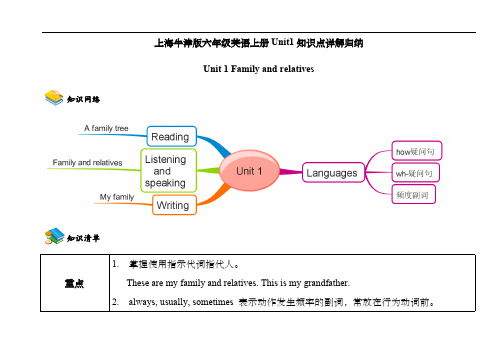
sister n.姐,妹
brother n.兄,弟
cousin n.堂/表兄弟姐妹
区别 relative 和 family
区别含义:在英语国家中,family 通常指自己的父母、兄弟姐妹等成员;而 relative 指的是除此之外 与自己有血缘关系或非血缘关系的亲属。
区别用法:family 既可以用来指家庭,也可以指家庭成员。表示家庭时,它是单数名词;表示家庭成
How many cousins do you have? 你有几个表(堂)兄弟(姐妹)?
也可以用如下方式表示相同的含义:
They haven’t any children. 他们没有孩子。
Has Ann a son? 安有儿子吗?
How many cousins have you got? 你有几个表(堂)兄弟(姐妹)?
知识网络
上海牛津版六年级英语上册 Unit1 知识点详解归纳 Unit 1 Family and rel。 These are my family and relatives. This is my grandfather.
2. always, usually, sometimes 表示动作发生频率的副词,常放在行为动词前。
【答案】seven/7, grandfather, grandmother, father, mother, sister, brother, (pet) dog
例 2.(★★)Alice _______ the first to come and the last to leave.
A.always is
【答案】C
【句型语法篇】
例 5.(★★★)Most of the girls like_________at the supermarket.
沪教版牛津英语六(上)语法点
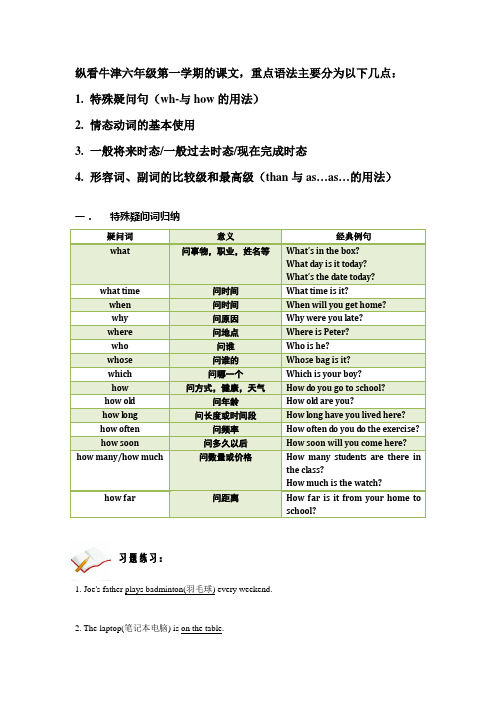
纵看牛津六年级第一学期的课文,重点语法主要分为以下几点:1.特殊疑问句(wh-与how的用法)2.情态动词的基本使用3.一般将来时态/一般过去时态/现在完成时态4.形容词、副词的比较级和最高级(than与as…as…的用法)一.特殊疑问词归纳疑问词意义经典例句what 问事物,职业,姓名等What’s in the box?What day is it today?What’s the date today?what time 问时间What time is it?when 问时间When will you get home?why 问原因Why were you late?where 问地点Where is Peter?who 问谁Who is he?whose 问谁的Whose bag is it?which 问哪一个Which is your boy?how 问方式,健康,天气How do you go to school?how ol d 问年龄How ol d are you?how long 问长度或时间段How long have you lived here?how often 问频率How often do you d o the exercise?how soon 问多久以后How soon will you come here? how many/how much 问数量或价格How many stud ents are there inthe class?How much is the watch?how far 问距离How far is it from your home toschool?习题练习:1. Joe's father plays badminton(羽毛球) every weekend.2. The laptop(笔记本电脑) is on the table.3. My mother is a nurse in the hospital.4. He gets up at 6:30 in the morning.5. Li Lei goes to work on foot.6. It is about 20 kilometers from my home to the town.7. I have lived in Hang Zhou for 20 years.8. I’m looking for my watch.9. The train will start in three minutes.10. Alice has the violin lesson twice a week.11. The building with green wall is the post office.12. He didn’t come because he was ill.注意事项:由于特殊疑问词孩子们从小学就已经开始接触,对于最基本的what/how/where等并不感到陌生,出题的难度一般也不会很大。
沪版牛津英语六年级(上)知识点提要

知识点提要:一、语音容易读错的生词音标(想不起来的话,课后音标一一对照)granddaughter almost friendly naughty promise reuse discuss island dragon market museum activity secretary bank clerk choir * parent project invitation club___________________________________________________________housing estate exitprawn * wingsour * enough pyramid yogurt exercise than suggestion porridge *二、词汇与词组1.容易错的单词拼写➢an aunt / an uncle 首字母发音都是元音,所以前面跟的不定冠词用“an”,同理,an hour ago (h不发音,所以用an).➢注意比较:an umbrella vs. a useful book 虽然都是字母U开头,但是因为u的发音不同,所以前面跟的冠词就不一样。
另外,需要特别注意interesting / exciting 这样的元音开头的形容词,它们放在某个单数名词前面做修饰,这时也要用冠词an;但如果在它们前面又加了程度副词v ery / more…则冠词又必须变回a。
比如:a book vs. an interesting book vs. a very interesting book➢the Earth (大写E,且前面必须使用定冠词the, 表示独一无二的事物) ➢Friends of the Earth 表示一个环保组织(属于专有名词),F / E大写。
牛津课本上是把他们看成该组织的所有成员(相当于people),动词用复数;不过,某些习题书上也会把它看成一个组织,动词用单数。
上海牛津版英语六年级第一学期6A期末复习知识点总结1

must not
必须、很重要或必要不准,不允许或禁止
Wemust study hard.
You mustn’t leave school alone.
提问
把情态动词单独提前
Must we wait foryou?Yes,youmust ; No,youneedn’t.(非mustn’t)
花钱花时间
.spen.tw.yua.o.thi.pen...spen.tw.yua.i.buyin.thi.pen.
I spend two yuan on this pen.=I spend two yuan in buying this pen.
表示提议的句型
Shall we
Shall是情态动词+接动词原形
a little
只能修饰不可数名词,a little milk.
some
a lot of plenty of
既可修饰可数名词又可修饰不可数名词。当及可数名词连用时,只能及可数名词的复数形式连用
k. Plent.o.eggs.
someeggs. a lot of milk. Plenty of eggs.
the one on the left/right , the one in the middle =the left/right/middle one.
地点、方位表述
near离**近
far(away)from离**(很)远
直接接地点
.liv.nea.school. H.live.fa.awa.fro.school.
六年级英语(上)知识点
频度副词
频度副词
always、sometimes、usually、never
6A上海牛津英语六年级第一学期重点
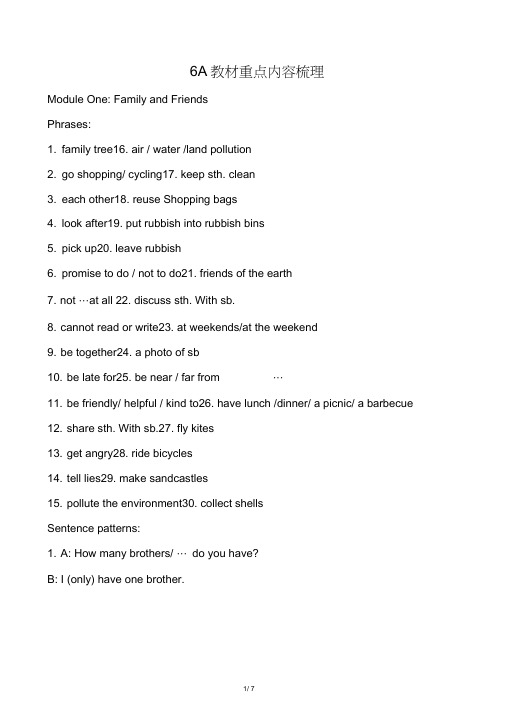
6A教材重点内容梳理Module One: Family and FriendsPhrases:1. family tree16. air / water /land pollution2. go shopping/ cycling17. keep sth. clean3. each other18. reuse Shopping bags4. look after19. put rubbish into rubbish bins5. pick up20. leave rubbish6. promise to do / not to do21. friends of the earth7. not …at all 22. discuss sth. With sb.8. cannot read or write23. at weekends/at the weekend9. be together24. a photo of sb10. be late for25. be near / far from …11. be friendly/ helpful / kind to26. have lunch /dinner/ a picnic/ a barbecue12. share sth. With sb.27. fly kites13. get angry28. ride bicycles14. tell lies29. make sandcastles15. pollute the environment30. collect shellsSentence patterns:1. A: How many brothers/ … do you have?B: I (only) have one brother.2. A: what do you do with yourB: I always/usually/ sometimes play games with ….A: What else do you do with sb.? B: I sometimes … with … 3. A: Have you been to…?B: I have just/already been to … / there. / I haven' t been to4. What about/How about + n./ving …?5. A: What do you usually do at weekends? B. I usually …6. A: Is … near or far away from …? B. It is near/ far away from ….7. A: Where have you been? 8. B: I have been to….9. Which place shall we visit? 10. When shall we go there? 11. What time?12. When are we going to come back? 13. How are we going to get there? 14. How much does it cost? Module Two: Places and Activities Phrases:…?… /ther1. a bank clerk2. a shop assistant3. put out fires4. cook food5. make our city a safe place6. look at7. listen to8. arrive at9. have tea10. at the entrance11. on the ground/ first floor12. on the open day13. at half past eight in the morning14. First,../Next, …/Then,…/After that,…/Fin ally, …15. take photos16. by ferry/ by underground/ on foot17. on the busSentence patterns:18. go to school19. a lot of/ some/ a few20.live near/far away from school21. an advertisement board22. light rail23. a department store24. a housing estate25. a police station26. half an hour27. wait for28. walk on the grass29. keep quiet30. run across the road31. pick the flowers32. turn left/right33. on the right/left34. in the middle35. go upstairs1. A: Would you like to be a/an …?B: Yes, I would.//No, I wouldn ' t.A: Why?/Why not?B: I would /wouldn ' t like to be a/an… because I2. A: What would you like to be?B: I would like to be …3. A: Do you live near or far away from B: I live near/far away from ….A: How do you go to school? B: I go to school by… /on foot.A: How long does it take? B: It takes …4. A: How long does it take you to get to…?B: It takes me about… to get there.5. A: What does Simon see when he is walking to school? B: Simon sees ...when he is walking to school.6. What does this sign mean?7. We must not eat or drink./Don' t eat ordrink.8. We must …9. A: Which escalator must we use? B: We must use the one in the middle. Module Three: Food and Drink phrases1. fried cabbage/chicken wings12. an unhealthy diet 2. steamed prawns with garlic13. do exercise 3. boiled eggs14. live in the countryside…?4. a shopping list15. stay with sb.5. at the vegetable stall16. plenty of / a lot of6. in the frozen food section17. a little/ some7. in the market/supermarket18. my favourite breakfast8. have a picnic19. too much spicy food9. a bottle of jam20. eating habits10. a packet of nuts21.the food pyramid11. a slice / slices ofSentence patterns:1. A: What would you like for dinner tonight?B: I ' d like …for dinner.A: What kind of …would you like?Would you like … or …?B: I ' d like …2. A: Have you bought any …?B: Yes, I ' ve bought some …A: Where did you buy it/them?B: In the market, at the …stall/i n the …secti on.A: How much was it/were they?B: It was /They were …yuan.3. A: Shall we buy some soft drinks?B: Ok./ That ' s a good idea.4. Let 's buy some bread and a bottle of jam.Let ' s go to the supermarket to buy some food and drink for the picnic.5A Would you like some …?B: No, thanks / yes, please6. A: Why do you like …?B: I like it/them because it 's/they ' re sweet/delicious/tasty/spicy.7. A: Why not?B: I don 't want … because it is too ….8. A: May I have some … , please?B. Ok/ Sure/ All right/ Yes, you may. Here you are.//NO, you may not./ I> Xyou can ' t..9. A: How much sugar do we need every day?B: We need a little sugar every day.10. A: Which one was healthier/less healthy?B: …' s diet was healthier than/less healthy than/as healthy as/as unhealthy as …' s diet.11. How much … do we need?12. What do you usually have for breakfast/ lunch /dinner?。
牛津上海版 六年级第一学期英语考点汇总
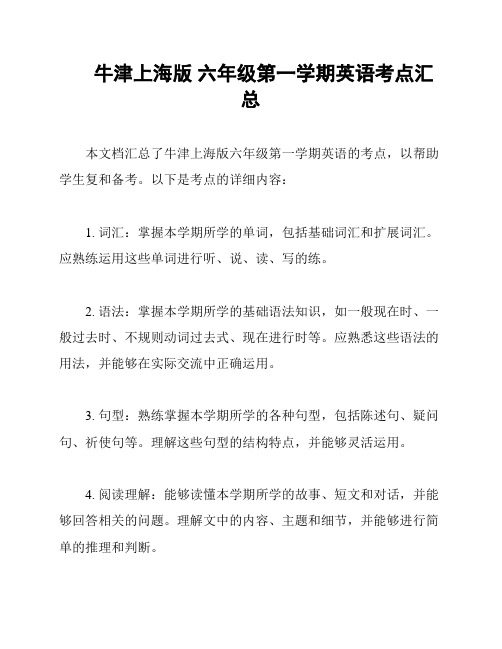
牛津上海版六年级第一学期英语考点汇
总
本文档汇总了牛津上海版六年级第一学期英语的考点,以帮助学生复和备考。
以下是考点的详细内容:
1. 词汇:掌握本学期所学的单词,包括基础词汇和扩展词汇。
应熟练运用这些单词进行听、说、读、写的练。
2. 语法:掌握本学期所学的基础语法知识,如一般现在时、一般过去时、不规则动词过去式、现在进行时等。
应熟悉这些语法的用法,并能够在实际交流中正确运用。
3. 句型:熟练掌握本学期所学的各种句型,包括陈述句、疑问句、祈使句等。
理解这些句型的结构特点,并能够灵活运用。
4. 阅读理解:能够读懂本学期所学的故事、短文和对话,并能够回答相关的问题。
理解文中的内容、主题和细节,并能够进行简单的推理和判断。
5. 听力理解:能够听懂本学期所学的对话、问答和短文,并能
够回答相关的问题。
理解听力材料中的信息、关键词和上下文,并
能够从中获取必要的信息。
6. 书写能力:书写要规范、清晰、工整。
应注意字母的大小写、大小比例和书写流畅度。
能够正确书写所学的单词、短语和句子。
7. 口语表达:能够运用所学的句型和词汇进行口语交流。
应注
意语音语调的准确性和自然流利度。
能够表达自己的观点、描述事
物和表达意愿。
希望通过对以上考点的复和总结,学生们能够在英语考试中取
得好成绩。
祝大家好运!
(Word count: 195)。
6A上海牛津英语六年级第一学期重点

6A教材重点内容梳理Module One: Family and FriendsPhrases:1. family tree16. air / water /land pollution2. go shopping/ cycling17. keep sth. clean3. each other18. reuse Shopping bags4. look after19. put rubbish into rubbish bins5. pick up20. leave rubbish6. promise to do / not to do21. friends of the earth7. not… at all 22. discuss sth. With sb.8. cannot read or write23. at weekends/at the weekend9. be together24. a photo of sb10. be l ate for25. be near / far from…11. be friendly/ helpful / kind to26. have lunch /dinner/ a picnic/ a barbecue12. share sth. With sb.27. fly kites13. get angry28. ride bicycles14. tell lies29. make sandcastles15. pollute the environment30. collect shellsSentence patterns:1. A: How many brothers/…do you have?B: I (only) have one brother.2. A: what do you do with your…?B: I always/usually/ sometimes play games with ….A: What else do you do with sb.?B: I sometimes … with …3. A: Have you been to…?B: I have just/already been to …/ there. / I haven’t been to …/there yet.4. What about/How about + n./ving…?5. A: What do you usually do at weekends?B. I usually …6. A: Is… near or far away from …?B. It is near/ far away from….7. A: Where have you been?8. B: I have been to….9. Which place shall we visit?10. When shall we go there?11. What time?12. When are we going to come back?13. How are we going to get there?14. How much does it cost?Module Two: Places and ActivitiesPhrases:1. a bank clerk2. a shop assistant3. put out fires4. cook food5. make our city a safe place6. look at7. listen to8. arrive at9. have tea10. at the entrance11. on the ground/ first floor12. on the open day13. at half past eight in the morning14.First,../Next,…/Then,…/After that,…/Finally,…15.take photos16. by ferry/ by underground/ on foot17. on the busSentence patterns:18. go to school19. a lot of/ some/ a few20.live near/far away from school21.an advertisement board22. light rail23. a department store24. a housing estate25. a police station26. half an hour27. wait for28. walk on the grass29. keep quiet30. run across the road31. pick the flowers32. turn left/right33. on the right/left34. in the middle35. go upstairs1.A: Would you like to be a/an…?B: Yes, I would.//No, I wouldn’t.A: Why?/Why not?B: I would /wouldn’t like to be a/an…because I…2.A: What would you like to be?B: I would like to be…3.A: Do you live near or far away from …?B: I live near/far away from ….A: How do you go to school?B: I go to school by…/on foot.A: How long does it take?B: It takes …4.A: How long does it take you to get to…?B: It takes me about…to get there.5.A: What does Simon see when he is walking to school? B: Simon sees ...when he is walking to school.6.What does this sign mean?7.We must not eat or drink./Don’t eat or drink.8.We must …9.A: Which escalator must we use?B: We must use the one in the middle.Module Three: Food and Drinkphrases1. fried cabbage/chicken wings12. an unhealthy diet2. steamed prawns with garlic13. do exercise3. boiled eggs14. live in the countryside4. a shopping list15. stay with sb.5. at the vegetable stall16. plenty of / a lot of6. in the frozen food section17. a little/ some7. in the market/supermarket18. my favourite breakfast8. have a picnic19. too much spicy food9. a bottle of jam20. eating habits10. a packet of nuts21.the food pyramid11. a slice / slices ofSentence patterns:1.A: What would you like for dinner tonight?B: I’d like …for dinner.A: What kind of …would you like?Would you like … or …?B: I’d like…2.A: Have you bought any…?B: Yes, I’ve bought some…A: Where did you buy it/them?B: In the market, at the…stall/in the…section.A: How much was it/were they?B: It was /They were…yuan.3.A: Shall we buy some soft drinks?B: Ok./ That’s a good idea.4.Let’s buy some bread and a bottle of jam.Let’s go to the supermarket to buy some food and drink for the picnic.5.A: Would you like some…?B: No, thanks / yes, please6.A: Why do you like…?B: I like it/them because it’s/they’re sweet/delicious/tasty/spicy.7.A: Why not?B: I don’t want … because it is too ….8.A: May I have some …, please?B. Ok/ Sure/ All right/ Yes, you may. Here you are.//NO, you may not./ I’m afraid you can’t..9.A: How much sugar do we need every day?B: We need a little sugar every day.10.A: Which one was healthier/less healthy?B:…’s diet was healthier than/less healthy than/as healthy as/as unhealthyas …’s diet.11.How much …do we need?12.What do you usually have for breakfast/ lunch /dinner?。
- 1、下载文档前请自行甄别文档内容的完整性,平台不提供额外的编辑、内容补充、找答案等附加服务。
- 2、"仅部分预览"的文档,不可在线预览部分如存在完整性等问题,可反馈申请退款(可完整预览的文档不适用该条件!)。
- 3、如文档侵犯您的权益,请联系客服反馈,我们会尽快为您处理(人工客服工作时间:9:00-18:30)。
6A教材重点内容梳理ModuleOne:FamilyandFriends
Phrases:
1.familytree
2.goshopping/cycling
3.eachother
4.lookafter
5.pickup
6.promisetodo/nottodo
7.not…atall
8.cannotreadorwrite
9.betogether
10.belatefor
11.befriendly/helpful/kindto
12.sharesth.Withsb.
13.getangry 14.telllies
15.pollutetheenvironment
16.air/water/landpollution
17.keepsth.clean
18.reuseShoppingbags
19.putrubbishintorubbishbins
20.leaverubbish
21.friendsoftheearth
22.discusssth.Withsb.
23.atweekends/attheweekend
24.aphotoofsb
25.benear/farfrom…
26.havelunch/dinner/apicnic/abar becue
27.flykites 28.ridebicycles
29.makesandcastles
30.collectshells
Sentencepatterns:
1.A:Howmanybrothers/…doyouhave
B:I(only)haveonebrother.
2.A:whatdoyoudowithyour…
B:Ialways/usually/sometimesplaygameswith….
A:Whatelsedoyoudowithsb.
B:Isometimes…with…
3.A:Haveyoubeento…
B:Ihavejust/alreadybeento…/there./Ihaven’tbeento…/thereyet.
4.Whatabout/Howabout+n./ving…
5.A:Whatdoyouusuallydoatweekends
B.Iusually…
6.A:Is…nearorfarawayfrom…
B.Itisnear/farawayfrom….
7.A:Wherehaveyoubeen
8.B:Ihavebeento….
9.Whichplaceshallwevisit
10.Whenshallwegothere
11.Whattime
12.Whenarewegoingtocomeback
13.Howarewegoingtogetthere
14.Howmuchdoesitcost ModuleTwo:PlacesandActivities Phrases:
1.abankclerk
2.ashopassistant
3.putoutfires
4.cookfood
5.makeourcityasafeplace
6.lookat
7.listento
8.arriveat
9.havetea
10.attheentrance
11.ontheground/firstfloor
12.ontheopenday
13.athalfpasteightinthemorning
14.First,../Next,…/Then,…/Afte rthat,…/Finally,…
15.takephotos
16.byferry/byunderground/onfoot
17.onthebus
18.gotoschool
19.alotof/some/afew
20.livenear/farawayfromschool
21.anadvertisementboard
22.lightrail 23.adepartmentstore
24.ahousingestate
25.apolicestation
26.halfanhour
27.waitfor
28.walkonthegrass
29.keepquiet
30.runacrosstheroad
31.picktheflowers
32.turnleft/right
33.ontheright/left
34.inthemiddle
35.goupstairs
Sentencepatterns:
1.A:Wouldyouliketobea/an…
B:Yes,Iwould.//No,Iwouldn’t.
A:Why/Whynot
B:Iwould/wouldn’tliketobea/an…becauseI…
2.A:Whatwouldyouliketobe
B:Iwouldliketobe…
3.A:Doyoulivenearorfarawayfrom…
B:Ilivenear/farawayfrom….
A:Howdoyougotoschool
B:Igotoschoolby…/onfoot.
A:Howlongdoesittake
B:Ittakes…
4.A:Howlongdoesittakeyoutogetto…
B:Ittakesmeabout…togetthere.
5.A:WhatdoesSimonseewhenheiswalkingtoschool
B:Simonsees...whenheiswalkingtoschool.
6.Whatdoesthissignmean
7.Wemustnoteatordrink./Don’teatordrink.
8.Wemust…
9.A:Whichescalatormustweuse
B:Wemustusetheoneinthemiddle. ModuleThree:FoodandDrink
phrases
1.friedcabbage/chickenwings
2.steamedprawnswithgarlic
3.boiledeggs
4.ashoppinglist
5.atthevegetablestall
6.inthefrozenfoodsection
7.inthemarket/supermarket
8.haveapicnic
9.abottleofjam 10.apacketofnuts
11.aslice/slicesof
12.anunhealthydiet
13.doexercise
14.liveinthecountryside
15.staywithsb.
16.plentyof/alotof
17.alittle/some
18.myfavouritebreakfast
19.toomuchspicyfood
20.eatinghabits21.thefoodpyramid Sentencepatterns:
1.A:Whatwouldyoulikefordinnertonight
B:I’dlike…fordinner.
A:Whatkindof…wouldyoulike
Wouldyoulike…or…
B:I’dlike…
2.A:Haveyouboughtany…
B:Yes,I’veboughtsome…
A:Wheredidyoubuyit/them
B:Inthemarket,atthe…stall/inthe…section.
A:Howmuchwasit/werethey
B:Itwas/Theywere…yuan.
3.A:Shallwebuysomesoftdrinks
B:Ok./That’sagoodidea.
4.Let’sbuysomebreadandabottleofjam.
Let’sgotothesupermarkettobuysomefoodanddrinkforthepicnic.
5.A:Wouldyoulikesome…
B:No,thanks/yes,please
6.A:Whydoyoulike…
B:Ilikeit/thembecauseit’s/they’resweet/delicious/tasty/spicy. 7.A:Whynot
B:Idon’twant…becauseitistoo….
8.A:MayIhavesome…,please
B.Ok/Sure/Allright/Yes,youmay.Hereyouare.//NO,youmaynot./I’mafrai
dyoucan’t..
9.A:Howmuchsugardoweneedeveryday
B:Weneedalittlesugareveryday.
10.A:Whichonewashealthier/lesshealthy
B:…’sdietwashealthierthan/lesshealthythan/ashealthyas/asunhealth yas…’sdiet.
11.Howmuch…doweneed
12.Whatdoyouusuallyhaveforbreakfast/lunch/dinner
13.A:Whatdidyouhaveforbreakfastyesterday。
